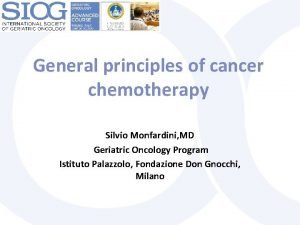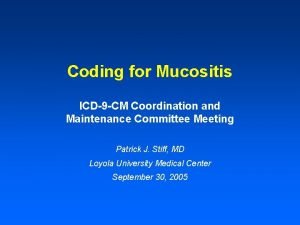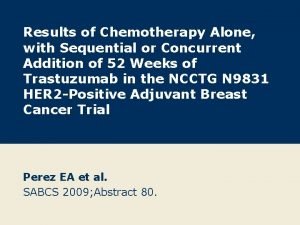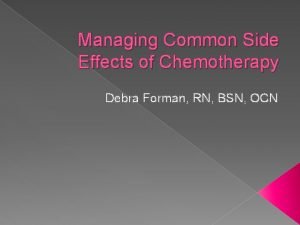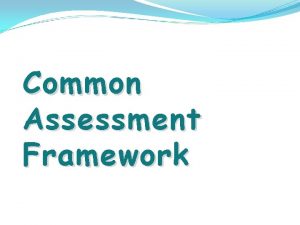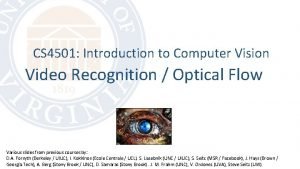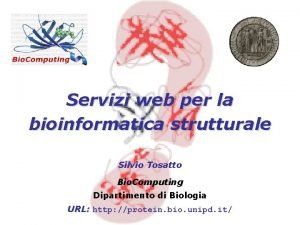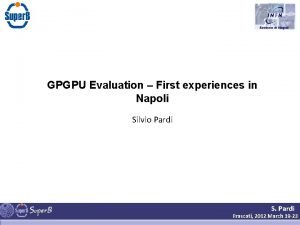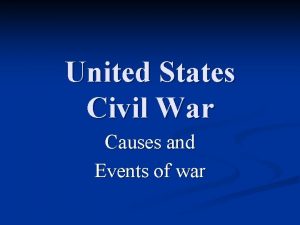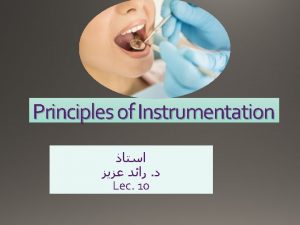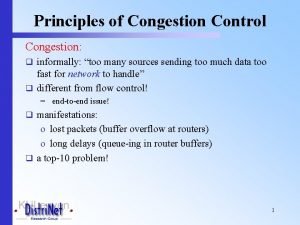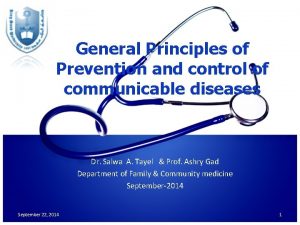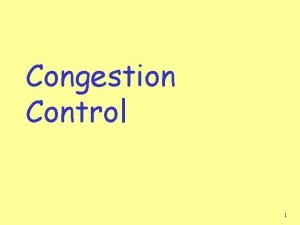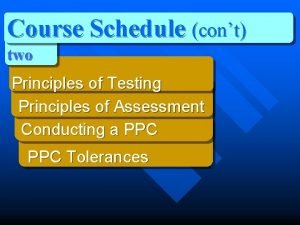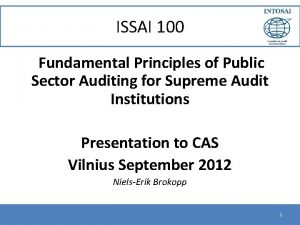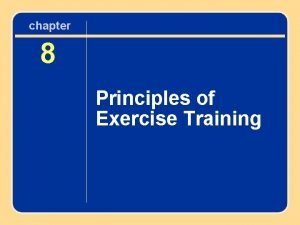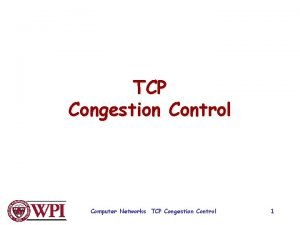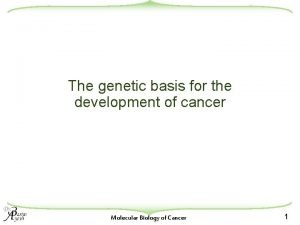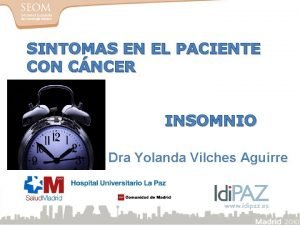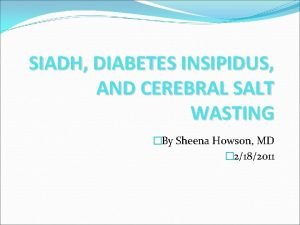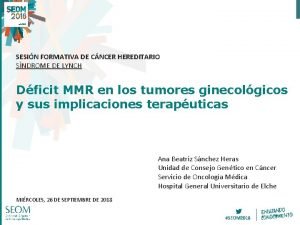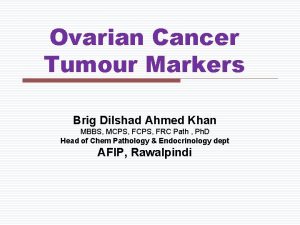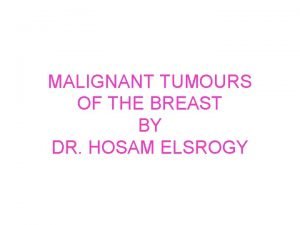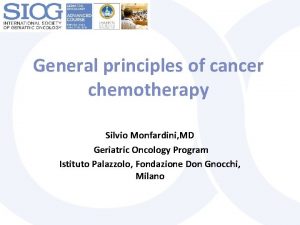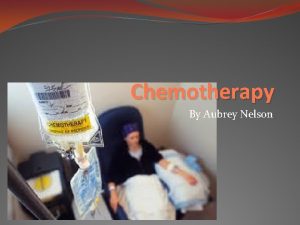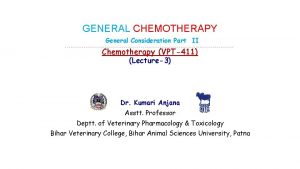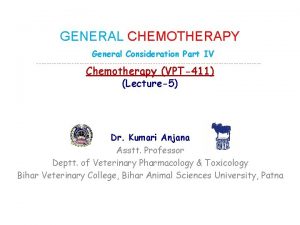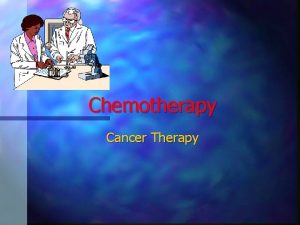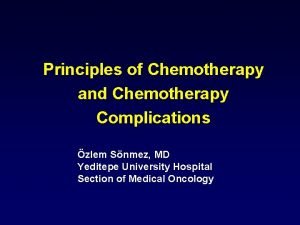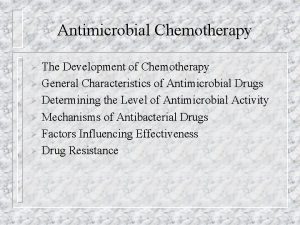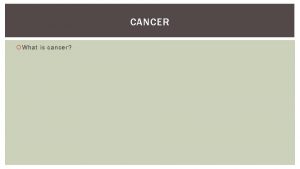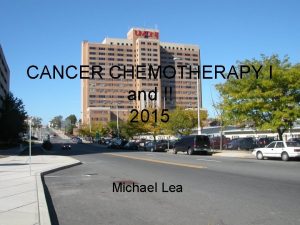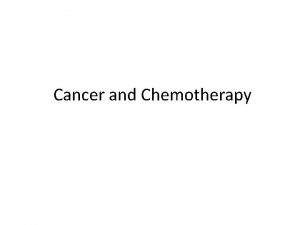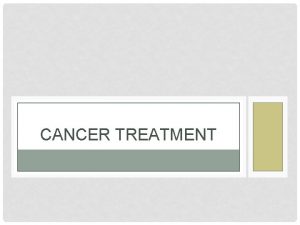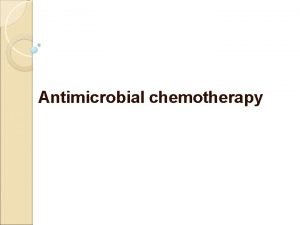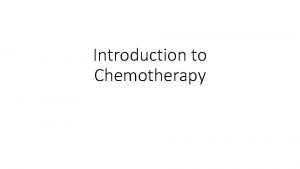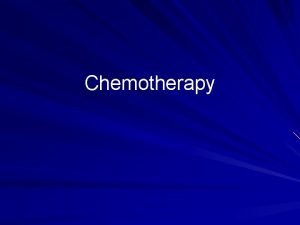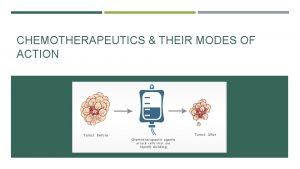General principles of cancer chemotherapy Silvio Monfardini MD

















































- Slides: 49

General principles of cancer chemotherapy Silvio Monfardini, MD Geriatric Oncology Program Istituto Palazzolo, Fondazione Don Gnocchi, Milano

Disclosure Session Chairman at a Meeting sponsored by Cellgene Recipient of a Bristol-Myers Squibb grant for the Project ‘the Italian Road Map for Geriatric Oncology’ Giotto. Evil exorcism in Arezzo

WHY GERIATRICIANS SHOULD BE INFORMED ON (SIDE EFFECTS OF) CANCER CHEMOTHERAPY?

Why Geriatricians should receive some information on cancer chemotherapy 1) Follow up of patients receiving chemotherapy 2) Preexistent comorbidity and possible effect on that organ (example cardiac insufficiency and cardiac toxicity) 3) Limits to chemotherapy administration (example anemia, hypoalbuminemia) 4) Balance on advantages/disadvantges

Has chemotherapy been replaced by the less toxic specific molecular targeted therapy and immunotherapy ? Unfortunately not(with the exception of CML and melanoma) , still chemo is used in the majority of tumor types, some time in combination with or sequencially with specific molecular targeted therapy or immunotherapy

The goal of chemotherapy in patients with advanced cancer Chemotherapy objective response rates (CR, PR) are leading to an increase in survival And generally to an improvement in the quality of life

Tumors in which cure by chemoterapy is possible in advanced-stage disease Gestional choriocarcinoma Testicular cancer Hodgkin’s lymphoma Aggressive non-Hodgkin’s lymphoma ALL, AML

Tumors in which useful responses by chemoterapy are possible in advancedstage disease • Breast Carcinoma • Lung Carcinoma • Colorectal Carcinoma • Ovarian Carcinoma • Prostate Carcinoma

Objective responses in advanced solid tumors have usually a limited duration Development of Cancer chemotherapy resistance : ability of cancer cells to evade the effects of chemotherapeutics

Adjuvant Chemotherapy can be administered after radical surgery to reduce the risk of recurrence Main examples: -Breast carcinoma -Colon carcinoma

From L Balducci Mediterranean J 2010

In the last 50 years Empirical drug screening of cytotoxic agents against uncharacterized tumor models Target-oriented drug screening of agents with defined mechanisms of action.


Catharanthus roseus (Madagascar Periwinkle) Vinca alkaloids: vinblastine, vincristine


Podophyllum peltatum : etoposide, teniposide


Camptotheca acuminata : Topotecan


Taxus brevifolia : Taxol

Mechloretamin 1945 Methotrexate 6 -mercaptopurin Busulfan 1950 Clorambucil Ciclophophamide Vinblastin, vincristin Fluorouracile, actinomycin. D Melphalan Procarbazin, 6 -thioguanin Cytosin arabinoside Adriamycin 1955 1960 1965 VAMP e POMP in acute leukemias First adj. chemother with actinomycin D in Wilms Tumor 1970 MOPP for Hodgkin’s disease

1970 Bleomycin, dacarbazin 1975 CCNU, BCNU, cisplatin 1980 Epirubicin Etoposide, Mitoxantrone ABVD in Hodgkin’s disease adjuvant CMF in breast. ca. adjuvant therapy for osteosarcoma Bone marrow transplantation PVB in testicular tumors Initial neoadjuvant chemother in various non resectable tumors 1985 Autologous bone marrow transplant with GM-CSF Ifosfamide + Mesna Carboplatin 1990 Vinorelbin Paclitaxel Docetaxel Camptotecin TARGETED THERAPY 1995 Combination of chemotherapeutic drugs with specific molecular targets (Herceptin, Iressa)

Drug development Timeline


COMBINATION CHEMOTHERAPY : a strategy to increase response and tolerability and to decrease resistance 1) use drugs with non overlapping toxicities so that each drug can be administered at nearmaximal dose; 2) combine agents with different mechanisms of action to inhibit the emergence of broad spectrum drug resistance

How many regimens in a pocket?

Example on the memento on dose and schedule

Chemotherapy complications are more common in the elderly • Myelosuppression 1: neutropenia, thrombocytopenia, anemia • Mucositis 2: oropharyngo-esophagitis, enterocolitis • Cardiomyopathy 3 • Peripheral neuropathy 1 • Central neurotoxicity 4: cognitive decline, delirium, cerebellar dysfunction 1. 2. 3. 4. Balducci The Oncologist 2000; Stein Cancer 1995 Von Hoff Ann Intern Med 1979; Gottlieb Cancer 1987

Clinical trials and drug toxicity in the elderly. The experience of the ECOG Group. Cancer, 1983.

Main toxicities after chemotherapy possibly requiring therapy in patients followed by Geriatricians Leukopenia, infection Anemia Mucositis Cardiac toxicity

Geriatricians following also cancer patients should know the timing of side effects of chemotherapy • Immediate • Early • Intermediate • Late

Side effects of chemotherapy 1. Immediate - Anaphylactic shock - Cardiac arrhythmia - Pain at the site of injection

Side effects of chemotherapy 2. Early - Nausea, vomiting - Fever - Hypersensitivity reactions - Flu-like syndrome - Cystitis

Side effects of chemotherapy 3. Intermediate (within days) a) Bone-marrow depression - after 1 -3 weeks (majority of immunodepressive drugs)- after 4 -6 weeks (nitrosoureas) b) Stomatitis c) Diarrhoea d) Alopecia e) Peripheral neuropathy, loss of reflexes f) Paralytic ileus g) Renal toxicity h) Immunosuppression

Side effects of chemotherapy 4. Late (within months) • Injury to vital organs or system (heartadriamycin; lung-bleomycin and busulfan; livermethotrexate) • Effects on reproductive capacity (amenorrea, decreased sperm concentration) • Carcinogenic effects

Cancer chemotherapy administration in older patients Medical Oncologists: Specific knowledge and experience of the side effects and toxicities of the various cytostatic drugs Geriatricians know more on changes with aging associated with possible increased chemotherapy toxicity: reduced functional reserve (liver, kidney, heart), greater anemia, hypoalbuminemia

Geriatricians should know which drugs may cause problems in case of: Renal excretion: Cisplatin, Carbo, MTX, Capecitabine • Liver metabolism: antracyclines, taxanes, CTX, MTX, 5 FU • Anemia/ipoalbuminemia: antracyclines, taxanes • Cardiomyopathty / cardiac function: antracyclines, Trastuzumab 5 -FU, Taxol •

Excretion of drugs • A decline in glomerular filtration rate (GFR) is one of the most predictable changes associated with age • Additional effect of comorbid conditions on renal function • Creatinine clearance should be evaluated in every elderly cancer patient prior to Chemo administration

Drugs requiring dose modification in renal dysfuction (Cancer care in the older population, ASCO curriculum) % dose reduction based on Crcl(ml/min) 30 -60 10 -30 <10 cisplatin 50% Omit carboplatin 20% 30% cyclophosphamide 0% 0% 50% bleomycin 25% 50% methotrexate 50% Omit Nitrosoureas Omit Capecitabine 75% Omit

Changes in hepatic metabolism in older patients leading to possible increased toxicity • Reduced Blood Flow • Reduced liver dimensions • Polypharmacy

DRUGS AFFECTED BY CHANGES IN HEPATIC METABOLISM (Cancer care in the older population, ASCO curriculum) % dose reduction for hepatic dysfuction Mild (bili*1. 5 -3. 0; SGOT**60180) Moderate (bili*3. 1 -5. 0; SGOT**>180) Severe (bili*>5. 0) Anthracyclines Adriamycin daunorubicin 50% 25% 75% 50% Omit Taxanes Omit Vinca Alkaloids Epipodophyllotoxins 50% Omit Methotrexate 0% 25% Omit Cyclophosphamide 0% 5% Omit 5 -fluorouracil 0% 0% Omit

Why Anemia and Hypoalbuminemia may lead to increased toxicity Several circulating antitumor drugs (anthracyclins, epipodofillotoxines, taxanes, camptotecins) are bound to red cells and to albumin. If there is a decrease of red cells as well as of albumine, the unbound drug concentration increases A low hemoglobin concentration is therefore an independent risk factor for toxicity. And the same for albumin

Cardiotoxicity / Cardiomiopathy Risk Factors • • • previous RT to the chest wall preexisting cardiac disease age > 65 years Other than anthracyclins , drugs potentially cardiotoxic: 5 -fuorouracil, Taxanes, Trastuzumab, Pertuzumab

BRITISH MEDICAL JOURNAL AND LANCET, 1969

Anthracycline cardiotoxicity in the elderly cancer patient: a SIOG expert position paper Doxorubicin-induced cardiotoxicity is related with cumulative dose Conventional doxorubicin-related CHF was 5% at a cumulative dose of 400 mg/m 2, 16% at a dose of 500 mg/m 2 26% at a dose of 550 mg/m 2 Age was a risk factor, hazard ratio (HR) of 2. 25 in patients older than 65 years compared with those aged 65 years or younger.

Bone marrow Tolerance to Chemotherapy Lessens With Age • With age comes increased risk of - neutropenia and its complications

Toxicity of adjuvant chemotherapy for breast cancer increases with age Postmenopausal women, “classic” CMF q 28 d 3 20 <65 years (n = 223) >65 years (n = 76) Patients (%) 15 10 5 0 Grade 3 toxicity any type Grade 3 hematologic toxicity Grade 3 mucositis Crivellari D, et al. J Clin Oncol. 2000; 18: 1412 -1422.

Central and peripheral nervous system possible toxicity of chemotherapeutic agents(possible additive effect on preexistent neurologic comorbidity) • Peripheral nervous system (distal peripheral neuropathy): cisplatin, vincristine, taxanes, and thalidomide • CNS (encephalopathy of various severities): methotrexate, vincristine, ifosfamide, fludarabine, cytarabine, 5 -fluorouracil, cisplatin , cyclosporine and the interferons

Chemotherapy complications are more common in the elderly But: some drugs are elderly friendly Some drugs are better candidates for elderly: • Vinorelbine, • Gemcitabine, • Carboplatin, • Caelix
 General principles of chemotherapy
General principles of chemotherapy Principles of chemotherapy
Principles of chemotherapy Bsa calculation formula for chemotherapy
Bsa calculation formula for chemotherapy Chemotherapy coding cheat sheet
Chemotherapy coding cheat sheet Chemotherapy
Chemotherapy Debra forman
Debra forman Caf pre assessment checklist
Caf pre assessment checklist 4ac 4t chemotherapy
4ac 4t chemotherapy Empreendedor silvio santos
Empreendedor silvio santos Lukas-kanade
Lukas-kanade Silvio teitelbaum
Silvio teitelbaum Silvio santos botox
Silvio santos botox Liceo classico cuneo
Liceo classico cuneo Silvio santos figli
Silvio santos figli Silvio hiroshi nakao
Silvio hiroshi nakao Parafacias
Parafacias Silvio tosatto
Silvio tosatto Silvio frascati
Silvio frascati Silvio cesare
Silvio cesare Istituto comprensivo silvio pellico vedano olona
Istituto comprensivo silvio pellico vedano olona Liceo peano pellico cuneo
Liceo peano pellico cuneo Planos en cinematografia
Planos en cinematografia Where did general lee surrender to general grant?
Where did general lee surrender to general grant? Standard pen grasp
Standard pen grasp General principles of congestion control
General principles of congestion control General principles of prevention
General principles of prevention Hop by hop choke packet
Hop by hop choke packet Congestion control principles
Congestion control principles Purchasing and receiving
Purchasing and receiving Enzyme catalyze
Enzyme catalyze General principles of testing
General principles of testing Site:slidetodoc.com
Site:slidetodoc.com What are the general principles of assessment
What are the general principles of assessment General principles of public sector auditing
General principles of public sector auditing Principles of periodontal surgery
Principles of periodontal surgery 8 principles of exercise
8 principles of exercise General principles of congestion control
General principles of congestion control Welding causes cancer
Welding causes cancer Tnm staging lung cancer
Tnm staging lung cancer Will you fight now or wait for this
Will you fight now or wait for this The genetic basis of cancer
The genetic basis of cancer Thames valley cancer network
Thames valley cancer network Tabla benzodiacepinas
Tabla benzodiacepinas Siadh pathophysiology
Siadh pathophysiology Criterios de amsterdam cancer de colon
Criterios de amsterdam cancer de colon Escorpio y piscis
Escorpio y piscis High sierra ahec
High sierra ahec Ca 125
Ca 125 Cdk breast cancer
Cdk breast cancer Manchester classification of breast cancer
Manchester classification of breast cancer
